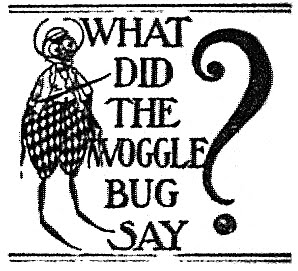Originally published in the Philadelphia Public Ledger, February 27, 1916.
Oliver Elephant and Tommy Tapir had a secret; at least they said they had a secret. Of course, all the other boys and girls in Professor Bear’s school wanted to know what it was, so they took them aside one at a time and told them. “Let me introduce you to the Fly family,” Oliver would say to each one. Then he would bring forward Tommy Tapir and pretend he was Mr. Bottle Fly, and when they said howdy to him, he would bring him out again and say, Mr. Common Fly, and when they said howdy, kind of mad-like, he would bring Tommy out again, this time calling him Mr. Dragon Fly. “And NOW let me make you acquainted with MR. LETTER FLY!” he would say last of all—and while they were looking for Tommy Tapir again Oliver would swing round with his long trunk and tumble them on the ground. I declare, I’m ashamed of him, aren’t you?
The Supposies all go to the zoo;
And why not, I pray, when ’tis only a mile?
I am sure I should like to go, too.
There are seventy houses and sixty-nine caves,
A merry-go-round and a pond;
There are swans and a lake, and, tip-toppety sake!
A real sure-enough jungle beyond.
Oh, indeed, you have never once seen such a zoo,
Just the thought of it gives me a thrill;
And you certainly must not neglect to go there
When you visit Supposyville.
The remark’blest thing in this wonderful zoo,
And the thing that will strike you at once,
Is the fact that the animals never are sad,
Though they’ve been there for years and some months.
Their expressions are cheerful, and each in his cage
Paces thoughtfully to, and then fro;
Not a growl of displeasure, ill humor or rage
Does one hear—yes, this really is so.
And they never display by a look nor a tone
A desire to eat up girls and boys;
Now the lions I know make me feel like a bone,
And I must say it upsets my poise.
But a stranger things still is the fact that the bears,
And the elephants, camels and such,
All refreshments like peanuts and popcorn decline
With commendable sternness to touch!
But, pshaw! I could talk for a week straight ahead
Of this jolly Supposyville zoo;
But, alas, as it stands, I have here on my hands
Quite a number of things, dear, to do.
And I’ll only say this, ’tis no wonder the bears
And the lions and tigers are gay,
For some are of plush and still others of wood,
And a lot of them simply are clay;
And all of them made by Sir Solomon
Can walk, yawn and roll up their eyes,
And are all so delightfully lifelike and real
They’re a credit to Solomon Wise.
And why should real creatures be locked up in jail
For a lifetime, and droop behind bars?
“Why, ’twould be a good thing,” said the Queen to the King,
“If all other zoos just copies ours.”
(I think so, too!)







